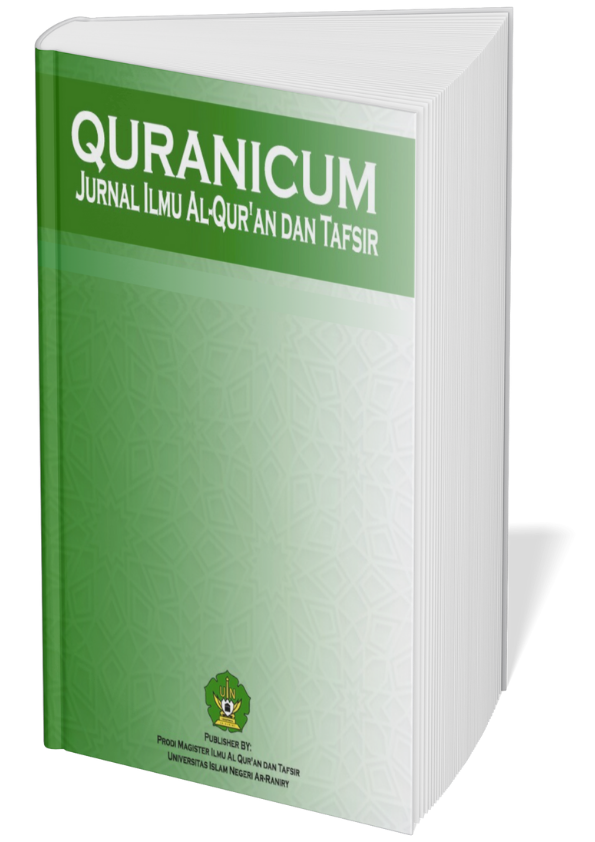Kebebasan Beragama dalam Konteks Sosial Perspektif Al-Qur’an
DOI:
https://doi.org/10.22373/quranicum.v2i1.6661Keywords:
Agama, Sosial, ToleransiAbstract
The use of religious identity to create a negative view of other religious groups if not limited by tolerance will greatly affect the social attitude between religious communities, because claims can damage social relations. Misunderstandings in interpreting religious texts exist in every religion, including Islam. So it is important for Muslims to understand the meaning of the Qur'an as a reference for their religion. This research focuses on several verses of the Qur'an that are considered closest to discussion the freedom of religion in a social context. The purpose of this study is to understand the meaning of religious freedom in the Qur'an through classical and contemporary interpretations, reveal how the Qur'an builds interfaith social dialogue, and tolerance of religious freedom based on the Qur'an. This type of research is library research, with qualitative methods and analytical descriptive data analysis techniques. The results of this study indicate that QS. Al-An'am (6):108 prohibits insulting the gods of polytheists as a reflection of manners in Islam, QS. Al-Mumtahanah (60):8 allows doing good to non-Muslims who do not fight Islam with a variety of interpretations by the mufasir, and QS. Al-Kafirun (109):6 emphasizes the uncompromising separation of beliefs, with different mufasir focuses. Dialogue in the Qur'ān includes deep interaction between creatures and God, fellow human beings and nature, promoting wisdom, respect, justice and equality. Tolerance in the Qur'an includes religious freedom, recognition of diversity, peace, cooperation in goodness, protection for minorities, and viewing differences as sunnatullah that support harmony in the life of the nation and state.
ABSTRAK
Penggunaan identitas agama untuk menciptakan pandangan negatif terhadap kelompok agama lain jika tidak dibatasi dengan toleransi akan sangat berpengaruh kepada sikap bersosial antar umat beragama, karena klaim tertentu dapat merusak hubungan sosial. Kesalahpahaman dalam memaknai nash-nash agama hampir ada di setiap agama termasuk agama Islam. Maka umat muslim penting untuk memahami dengan baik maksud Al-Qur’an sebagai rujukan agamnya. Penelitian ini fokus pada beberapa ayat Al-Qur’an yang dianggap paling dekat dengan pembahasan kebebasan beragama dalam konteks sosial. Tujuan penelitian ini untuk memahami maksud kebebasan beragama dalam Al-Qur’an melalui tafsir klasik dan kontemporer, mengungkap cara Al-Qur’an membangun dialog dan toleransi antaragama berdasarkan Al-Qur’an. Jenis penelitian ini adalah penelitian kepustakaan (library research), dengan metode kualitatif dan teknik analisis data deskriptif analitis. Hasil penelitian ini menunjukkan bahwa QS. Al-An’am (6):108 melarang menghina Tuhan kaum musyrik sebagai cerminan adab dalam Islam, QS. Al-Mumtahanah (60):8 membolehkan berbuat baik kepada non-Muslim yang tidak memerangi islam dengan variasi tafsir oleh para mufasir, dan QS. Al-Kafirun (109):6 menegaskan pemisahan akidah tanpa kompromi, dengan fokus mufasir yang berbeda-beda. Dialog dalam Al-Qur’an mencakup interaksi mendalam antara makhluk dengan Tuhan, sesama manusia, dan alam, mengedepankan hikmah, penghormatan, keadilan, dan kesetaraan. Toleransi dalam Al-Qur’an mencakup kebebasan beragama, pengakuan keberagaman, perdamaian, kerja sama dalam kebaikan, perlindungan bagi minoritas, dan memandang perbedaan sebagai sunnatullah yang mendukung harmoni dalam kehidupan berbangsa dan bernegara.
References
Al-Maraghi, Ahmad Mustafa. Tafsir Al-Maraghi. 7th ed. Mesir: Mostaba Al-Bab Al-Halabi, 1947.
Al-Qurthubi, Abu Abdulllah Muhammad bin Ahmad al-Anshari. Al-Jami’ Li Ahkam Al-Qur’an. 7th ed. Mesir: Dār al-Kitab al-misrīyah, 1964.
Al-Wahidi, Abu Hasan Ali bin Ahmad bin Muhammad. Asbāb Al-Nuzūl Al-Qur’an. al-Damam: Dar al-Islah, 1912.
Amtiran, Abdon Arnolus, and Arimurti Kriswibowo. “Kepemimpinan Agama Dan Dialog Antaragama: Strategi Pembangunan Masyarakat Multikultural Berbasis Moderasi Beragama.” Jurnal Penelitian Agama Hindu 8, no. 3 (2024): 331–48. https://doi.org/10.37329/jpah.v8i3.3165.
Asy-Syaukani, Imam Muammad bin ‘Ali bin Muhammad. Tafsir Fathul Qadir. Edited by Sayyid Ibrahim. 6th ed. Jakarta: Pustaka Azam, n.d.
Ath-Thabari, Abu Ja’far Muhammad bin Jarir. Jami’ Al-Bayan ‘an Ta’Wil Ala-Qur’an. 12th ed. Mekkah: Dār al-Tarbīyah wa al-turast, n.d.
Azmi, Kariematul, Bramantyo Dwi Wahyu, M. Ghilman Kafa, M. Nurul Fajri, and Tangguh Bayu Mukti. “Pola Komunikasi Efektif Dalam Moderasi Beragama: Membangun Dialog Harmonis.” Jurnal Al-Tsiqoh (Dakwah Dan Ekonomi) 8, no. 2 (2023): 33. https://e-journal.uac.ac.id/index.php/altsiq/article/view/3678.
Bakar, Abdurrahman bin Abi, and Jalaluddin Al-Suyuti. Lubaab Al-Tafsir Min Ibni Katsir. 1st ed. Beirut: Dar al-kutub al-‘ilmiah, n.d.
Breskaya, Olga. “Introduction: Religius Freedom: Between Governance and Social Perpection Introduction:Liberte Religieuse: Entre Gouvernance Et Perception Sociale.” Jurnal Social Compass 68, no. 3 (2001): 1. https://journals.sagepub.com/doi/abs/10.1177/00377686211039072.
Chudzaifah, Ibnu, and Et.al. “Membangun Kerukunan Antarumat Beragama: Peran Strategis PAI Dalam Meningkatkan Dialog, Toleransi Dan Keharmonisan Di Indonesia.” Al-Fikr: Jurnal Pendidikan Islam 10, no. 1 (2024): 4. http://jurnal-tarbiyah.iainsorong.ac.id/index.php/alfikr/article/view/380.
Fahmi, Muhammad, Muhammad Nawawi, Senata Adi Prasetia, Fayaz Mahassin Syifa’i Adienk, Zakiyatul Nisa’, and Sonia Isnatin Suratin. “Konstruksi Nilai-Nilai Toleransi Berbasis Al-Quran Sebagai Upaya Menangkal Narasi Radikalisme Agama Di Indonesia Kontemporer.” Al-Banjari : Jurnal Ilmiah Ilmu-Ilmu Keislaman 22, no. 1 (2023): 59–87. https://doi.org/10.18592/al-banjari.v22i1.6239.
Fatmawati. “Transformasi Gerakan Radikalisme Menuju Moderasi Beragama.” KURIOSITAS Media Komunikasi Sosial Dan Keagamaan 16, no. 1 (2023): 77–90. http://ejurnal.iainpare.ac.id/index.php/kuriositas.
Hakim, Lukmanul. “Kebebasan Beragama Dalam Perspektif Islam.” TAJDID : Jurnal Ilmu Keislaman Dan Ushuluddin 20, no. 1 (2017): 39–50. https://doi.org/10.15548/tajdid.v20i1.166.
Herman, Ronaldo Heinrich. “Kebutuhan Akan Pengakuan Agama Shinto Sebagai Salah Satu Agama Resmi Dalam Peraturan Perundang-Undangan Sebagai Usaha Pemenuhan Hak Kebebasan Beragama Pemeluk Agama Shinto Di Indonesia.” Jurnal Ilmu Sosial Dan Pendidikan (JISIP) 7, no. 2 (2023): 1726–33. https://doi.org/10.58258/jisip.v7i1.5022/http.
Katsir, Ibnu. Lubaab Al-Tafsir Min Ibni Katsir. Edited by Abdullah bin Muhammad bin Ishaq. 1st ed. Kairo, 1994. Muassasah Dar al-Hilāl.
MacDonald, Gregory, Mohamad Abdalla, and Nahid Afrose Kabir. “Factors Influencing Australian Muslims’ Attitudes toward Christian-Muslim Dialogue: The Case of Sunni Muslims of Adelaide and Uniting Church Christians.” Religions 13, no. 9 (2022). https://doi.org/10.3390/rel13090835.
Mariatin. “E-Modul Sosiologi”, Dalam e-Modul 2019 Direktorat Pembinaan SMA-Kementerian Pendidikan Dan Kebudayaan.” Repositori Institusi, 2020. https://repositori.kemdikbud.go.id/19472/.
Muhaemin, Enjang, and Irfan Sanusi. “Intoleransi Keagamaan Dalam Framing Surat Kabar Kompas.” Communicatus: Jurnal Ilmu Komunikasi 3, no. 1 (2019): 17–34. https://doi.org/10.15575/cjik.v3i1.5034.
Nasution, Abdul Saman. “Strategi Membangun Nilai-Nilai Toleransi Antar Umat Beragama di Indonesia.” JPDSH Jurnal Pendidikan Dasar Dan Sosial Humaniora 2, no. 1 (2022): 123–36. https://bajangjournal.com/index.php/JPDSH/article/view/5370.
Primarni, Amie. “Pendidikan Islam Dan Tantangan Kontemporer: Strategi Mengatasi Radikalisme Dan Ekstremisme Melalui Pendidikan Holistik.” Jurnal Dirosah Islamiyah 6, no. 1 (2024): 67–80. https://doi.org/10.17467/jdi.v6i1.572.
Qutb, Sayyid. Fi Zilal Al-Qur’an. Mesir: Dar al-Syuruk, 1972.
Rahmah, W. “Dialog Antaragama Perspektif Al-Qur’an.” Jurnal Moderasi 3, no. 2 (2023): 72–91. https://ejournal.uin-suka.ac.id/ushuluddin/moderasi/article/view/4833.
Shihab, M. Quraish. Tafsir Al-Mishbah (Pesan, Kesan Dan Keserasian Al-Qur’an). Edited by 3. Jakarta: Lentera Hati, 2002.
Suhartawan, Budi, and Haris Renaldi. “Perspektif Al-Qur’an Tentang Toleransi Beragama.” TAFAKKUR : Jurnal Ilmu Al-Qur’an Dan Tafsir 4, no. 2 (2024): 215–30. https://doi.org/10.62359/tafakkur.v4i2.254.
Downloads
Published
How to Cite
Issue
Section
License
Copyright (c) 2025 Zahratul Jannah

This work is licensed under a Creative Commons Attribution-NonCommercial-ShareAlike 4.0 International License.
Authors who publish in QURANICUM: Jurnal Ilmu Al-Qur'an dan Tafsir agree to the following terms:
- Authors retain copyright and grant the journal right of first publication with the work simultaneously licensed Attribution-NonCommercial-ShareAlike 4.0 International (CC BY-NC-SA 4.0) that allows others to share the work with an acknowledgment of the work's authorship and initial publication in this journal.
- Authors are able to enter into separate, additional contractual arrangements for the non-exclusive distribution of the journal's published version of the work (e.g., post it to an institutional repository or publish it in a book), with an acknowledgment of its initial publication in this journal.
- Authors are permitted and encouraged to post their work online (e.g., in institutional repositories or on their website) prior to and during the submission process, as it can lead to productive exchanges, as well as earlier and greater citation of published work. (See The Effect of Open Acces)











